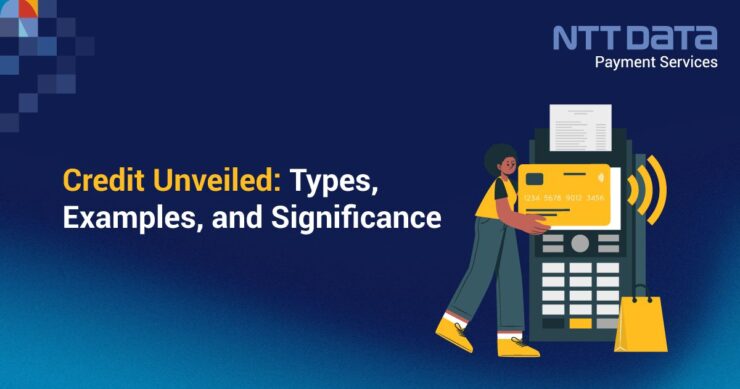
Table of Contents
Credit is a fundamental aspect of modern-day finance, and understanding its types, examples, and significance is crucial for making informed financial decisions. By comprehending the intricacies of credit, you can leverage it effectively and responsibly to achieve your financial goals.
Let’s explore the types & significance of credit in our daily lives and business opportunities.
Understanding Credit
In today’s world, credit has become an integral part of our financial lives. Whether buying a car, purchasing a house, or starting a business, credit plays a significant role in fulfilling our dreams and aspirations.
What is a Credit?
A credit is a financial arrangement in which a lender extends funds or resources to a borrower, expecting the borrowed amount to be repaid in the future, typically with interest. It is a trust or confidence bestowed in the borrower’s ability and willingness to repay the debt according to agreed-upon terms.
Credit enables individuals, businesses, and governments to make purchases and investments and fulfil financial needs that take time to be affordable with available cash. It plays a vital role in economic growth, providing opportunities for expansion and advancement.
Ensure all your credits oblige with RBI norms for easier credit accessibility and utilisation.
Recent Web Stories
What are the Types of Credit?
1. Revolving Credit:
Revolving credit gives borrowers a maximum borrowing limit, which can be used repeatedly as long as the borrower makes minimum monthly payments. Credit cards are a common example of revolving credit. They allow you to make purchases up to your credit limit and repay the borrowed amount over time, with interest charged on the outstanding balance.
For instance, if you have a credit card with a Rs. 100,000 limit, you can make purchases up to that amount, repay the balance, and continue using the available credit.
2. Installment Credit:
Installment credit involves borrowing a specific amount of money and repaying it in fixed monthly installments over a predetermined period.
Examples of installment credit include car loans, mortgages, and personal loans. With installment credit, borrowers know the exact amount to repay each month, making budgeting and financial planning more manageable.
3. Open Credit:
Open credit, also known as open-ended credit, is a type of credit that does not have a specific borrowing limit. Instead, it gives borrowers a maximum credit limit, which can be used repeatedly. Unlike revolving credit, open credit typically requires the borrower to repay the outstanding balance monthly.
Open credit includes charge cards, such as American Express, & store credit cards, etc. You can buy products at that specific store and have a grace period to repay the balance before any interest is charged.
| Tips: Also, check the Importance of credit ratings |
4. Secured Credit:
Secured credit involves borrowing money against an asset that serves as collateral. The asset, such as a home or a car, acts as security for the lender if the borrower fails to repay the debt. Secured credit often offers lower interest rates than unsecured credit because the collateral reduces the lender’s risk. Common examples of secured credit include mortgage loans and auto loans.
Let’s say you want to build your credit history but have limited credit or a low credit score. You approach a bank and apply for a secure credit card. The bank approves your application and grants you a credit limit of Rs. 100,000. However, to secure the credit card, the bank requires you to provide a cash deposit of Rs. 50,000 as collateral.
5. Unsecured Credit:
Unsecured credit does not require any collateral. Lenders provide funds based on the borrower’s creditworthiness, relying on factors such as credit history, income, and employment status. Credit cards and personal and student loans are common examples of unsecured credit. Since there is no collateral involved, unsecured credit generally carries higher interest rates to compensate for the increased risk to the lender.
Examples include credit cards, personal loans, and some lines of credit. Since there is no collateral involved, lenders often assess the borrower’s credit history and income to determine eligibility and interest rates.
Remember, a credit rating is also as important as a credit score.
Access Credit With NTT DATA Payment Services
Make all your credit transactions seamless with NTT DATA Payment Services. Get access to 256-bit encrypted security to keep your transactions safe. You can automate your credit payments automatically through our payment gateway.
NTT DATA Payment Services offers a complete payment solution to advance your offline and online businesses from,
- Online Payment Gateway
- POS machines
- IVR payments
- Mobile applications, and
- Bharat QR Scan and Pay
We ensure maximum comfort, convenience, and safety for all your payments.
Significance of Credit
Credit plays a significant role in our personal and professional lives. You can improve your credit scores by paying your credit bills on time.
Here are some vital aspects highlighting its importance.
1. Financial Flexibility
Credit allows you and your business to manage your financial needs effectively. It allows you to make purchases or investments without paying the total amount upfront. This flexibility can be particularly useful in emergencies or when capital is required for growth opportunities.
2. Building a Positive Credit History
Responsible use of credit helps build a positive credit history, which is essential for accessing future credit at favourable terms. Lenders consider credit history when determining interest rates and loan approvals. You can establish a solid credit profile by using credit responsibly and making timely payments, enabling them to secure better loan terms in the future.
3. Economic Growth
Credit plays a vital role in economic growth. By providing businesses with access to capital, credit allows them to expand operations, invest in new technologies, and create job opportunities. Similarly, consumer credit drives consumer spending, contributing to economic growth and stability.
| Tips: Also, check the How to improve your credit score fast |
4. Access to Opportunities
Credit can provide you with opportunities that may not be accessible otherwise. For example, it allows students to finance their education, enabling them to pursue higher education and increase their earning potential. Additionally, entrepreneurs can use credit to start or expand their businesses, fostering innovation and economic development.
5. Rewards and Perks
Credit cards often come with rewards programs that offer cash back, airline miles, or other incentives based on spending patterns. When used responsibly, these rewards can provide additional value to credit users, such as discounts, travel benefits, or cash rebates.
Harness the Power of Credit
Credit is a powerful financial tool that empowers you and your businesses to achieve your goals. Understanding the different types of credit is crucial for making informed financial decisions.
By using credit responsibly and understanding its implications, you can leverage it to your advantage, building a solid financial foundation and seizing opportunities for personal and professional growth.
| Also, you can get frequent updates on nttdatapayments Instagram page. |
FAQs
- What are the four types of credits?
You can access several types of credits, but let’s discuss the four common types.
- Revolving credit
- Instalment credit
- Non-instalment
- Charge cards
- What is credit and its significance?
Credit is a financial concept that involves borrowing money or receiving goods and services with the promise of future repayment. It plays a significant role in both personal and business finance.
- What are the five classifications of credit?
The five classifications of credit are:
- Capacity
- Capital
- Character
- Collateral
- Conditions
- What is the significance of credit limits?
You can boost your credit score by increasing your credit limit and utilising a good ratio. A higher credit limit can also help you make larger purchases.
- What is the significance of credit management?
Credit management will improve cash flow and lower the rate of late payments. Credit management is significant as it reinforces a company’s liquidity.





